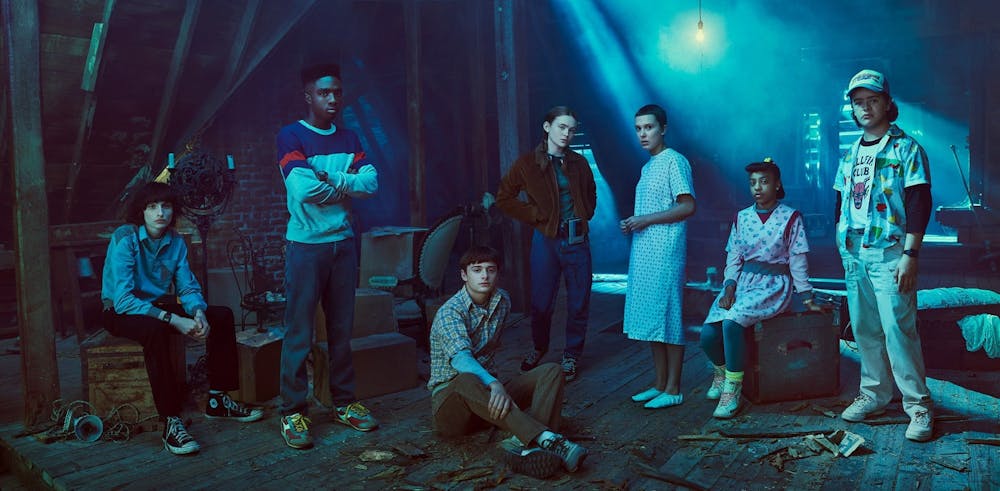On July 1, Netflix released the final two episodes of the fourth season of “Stranger Things.” With fan theories and viewership at an all-time high after the release of Vol. 1 on May 27, the highly anticipated season finale had countless expectations to live up to.
For the most part, these expectations were exceeded. The show has never been more emotionally resonant, visceral and all-around engaging. The Duffer brothers have replaced the nostalgia-fueled, buzzing energy of the third season with something more controlled and classically cinematic.
The expanded length of these episodes allowed for more characters to have their own emotional beats and complete character arcs while not letting up on the thrilling action sequences. Notable standouts include Max and Eleven overcoming their personal traumas, Hopper reuniting with Joyce and beloved new character Eddie redeeming himself and standing alongside Dustin to defend Hawkins.
These emotional beats contribute to Vol. 2’s very bleak tone. Even the humorous moments can’t deter the underlying sense of dread looming beneath the surface. The stakes have never been higher, and this can be felt in even the quietest of moments: Steve and Robin having a heart-to-heart, Will confiding in Jonathan, and Lucas and Max bonding.
This dread never lets up, which makes for a thoroughly engaging viewing experience. It fully manifests itself in the finale’s hour-long climactic scene, in which the storylines and characters come together through skillful cross-cutting. Paired with a version of Kate Bush’s “Running Up That Hill (A Deal with God)” that incorporates the signature synth sounds of the show’s score, the final action set piece is an epic battle between good and evil.
The fallout of these events is where the finale becomes a bit clunky. Forty minutes of resolution, while appropriate for the number of characters and plot lines that needed to be concluded, felt inefficient. Things went from one hundred back down to zero very quickly with no smooth transition.
Another overarching issue of the season is the balance between the different storylines. The Russia plot was dragged out for much longer than it needed to be and the California plot didn’t pick up until the final episode. While the editors deserve immense praise for being able to craft such an engaging story out of so much material, the constant cutting between different places becomes tedious.
Some of the character work was also lost in the final two episodes, particularly with Mike and Steve. Once the central protagonist, it’s become apparent that the writers aren’t entirely sure what to do with Mike now that the younger characters are growing up. Between the third season and now, his character development has been at a virtual standstill. Steve also had a somewhat disappointing arc. It became almost entirely about his pining for Nancy rather than his own development.
Nevertheless, most of the character work is better than ever. Alongside Eleven, Max quickly became a central focus of the season. Her character development is one of the most satisfying threads of the entire show. Lucas is finally given his own time to shine, and Eleven and Dr. Brenner’s relationship is explored on a deeper level.
However, it’s Will who has the most poignant moments in the final two episodes. His sexuality has been a topic of conversation online for a while, and it was implicitly addressed in a beautifully delicate way due to the writing and a wonderful performance from Noah Schnapp.
The performances in the final two episodes are the show’s best. It’s already been established that Millie Bobby Brown as Eleven and Sadie Sink as Max are fantastic. In Vol. 2, it’s Caleb McLaughlin, playing Lucas, Gaten Matarazzo as Dustin and Joseph Quinn in the role of Eddie that step up to the plate. They deliver some of the most gut-wrenching performances we’ve seen so far.
Overall, this season is the perfect buildup to what will surely be an epic fifth and final season. It’s not without its flaws, but those are overshadowed by thrilling set-pieces, impactful performances and masterful world-building. Vol. 2 solidifies “Stranger Things” as a generation-defining drama.



